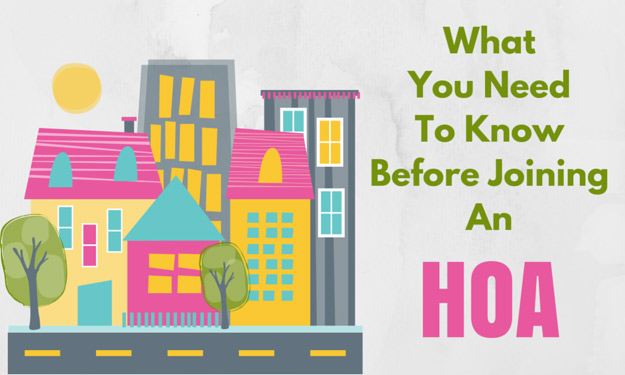1. Learn the HOA’s Rules
You may be able to find an HOA’s CC&Rs online, along with information about what happens if you violate a rule, which can include being fined, sued or having the HOA place a lien on your home. Ask the HOA if its online information is current before you rely on it. If you cannot find this information online, ask your real estate agent to acquire these documents for you or contact the HOA yourself.
2. Find Out if the Home You Want to Buy Is in Compliance
Buying into an existing problem can be a headache, so find out whether you would have to make changes to the home to comply with HOA rules. Does it need to be repainted? Is the landscaping dead or overgrown? Has the owner made exterior improvements without getting HOA approval? You may be able to force the owner to fix the problems as part of the sale agreement or provide cash at closing so you can remedy the issues as soon as you take possession.
3. Assess Environmental Practices
If environmentally friendly living is important to you, be aware that some HOAs may dictate that you use fertilizers, pesticides, sprinkler systems and whatever else it takes to keep your lawn picture-perfect. They may not allow xeriscaping (an environmentally friendly form of landscaping in arid climates) and may limit the size of gardens, ban compost piles and prevent you from installing solar panels. So make sure you check the fine print before you buy.
4. Consider Your Temperament
Are you the type of person who hates being told what to do? If so, living in a community with an HOA may be a very frustrating experience for you. One of the major benefits of homeownership is the ability to customize and alter the property to suit your needs, but HOA rules can really interfere with this. However, if you’re the type of person who likes rules and uniformity, driving down a picture-perfect street to get to your home every day might be your dream scenario.
5. Find Out About Fees
Fees will differ for each community. Because of this, you should make sure to ask your prospective HOA the following questions:
- How are HOA fee increases set?
- How often do increases occur, and by how much have they historically been raised? Martinez says that HOA fee increases usually don’t occur more often than annually and go up when the costs of service go up. In his experience HOA increases are mapped three to five years out. He suggests checking the HOA’s bylaws, as each HOA will have different guidelines for fee increases.
- Can you get a printed history of HOA dues by year for the last 10 years?
- How large is the HOA’s reserve fund? According to Manning, the size of a reserve fund will depend on the building’s age, condition and amenities (such as a heated swimming pool). “In evaluating a condominium purchase for our clients, we have our clients discuss the financial statements with a CPA expert in analyzing condominium financials,” he says.
- Can you get a record of special assessments that have been made in the past? Also ask if any special assessments are planned for the near future. Note that economies of scale can mean that special assessments are smaller in HOAs covering large communities and higher in smaller HOAs.
- What do the monthly dues cover? Will you still have to pay for garbage pickup? Is cable included?
6. Get a Copy of the Minutes from the Last HOA Meeting
The meeting minutes can be very telling about the HOA’s policies. Or better yet, sit in on a meeting before you buy. Some questions to ask are:
- What current and past conflicts has the association had to resolve?
- What is the process for resolving any conflicts?
- Has the HOA sued anyone? What was the outcome of that incident?
7. Watch for Under-Management
Not all HOAs are over-managed. The opposite problem may be an HOA where no one really cares and where no one is interested in maintaining the building, making repairs, hearing resident grievances or being on the board. Residents may simply take turns serving as HOA president or randomly appoint someone, so be prepared to serve in this role whether you want to or not if that is the case with your community’s HOA.
This would also be a good time to check into any restrictions preventing you from renting out your property or making it difficult to do so. What’s considered customary depends on the jurisdiction. “In the Seattle area, it is common to find prohibitions on short-term [vacation] rentals. HOAs have an interest in limiting the percentage of non-owner-occupied units, as mortgage lenders may be reluctant to lend on buildings that have high rental occupancy,” says Manning.
8. Ask About Catastrophe Insurance
Catastrophe insurance is particularly important if you’re considering a condo or townhouse purchase in an area prone to major natural disasters, such as floods, earthquakes, blizzards, wildfires, tornadoes or hurricanes. Pretty much every place is subject to at least one of these risks.
9. Consider the Impact of HOA Fees on Your Finances
When you are required to pay HOA fees, you have to buy a less expensive property to end up with the same total monthly housing cost and be approved for a mortgage. You might be able to buy a $100,000 condo with $500 a month in HOA fees, or you could get a $150,000 condo with $250 in HOA fees. One is not necessarily better than the other, but you need to look at what you’re getting for your money.
What do the HOA fees pay for? What will your quality of life be like in each community? And if you’re choosing between a $100,000 home with an HOA fee of $500 a month versus a $100,000 home without an HOA fee, what will you be able to do with that extra $500 a month? In the latter case, how much of it will you spend on things that the HOA would have covered? How much will you have left over? What kind of investment return are you likely to earn on that money?

